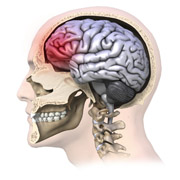Research and Innovation, UNL Office of

Center for Brain, Biology, and Behavior: Faculty Publications
Document Type
Article
Date of this Version
2017
Citation
Published in Applied Neuropsychology: Child, 2017
doi 10.1080/21622965.2017.1340158
PMID: 28657773
Abstract
School-based concussion management programs cover thousands of young athletes, yet there is little in the way of research to assess program processes or outcomes. This study examined the referral patterns of consultants working with ten high school concussion management programs. In addition to the number of referrals made to specialists, other potential outcome variables were explored. The sample included over 5,000 athlete-seasons and 298 concussions managed directly by certified athletic trainers. All programs used computerized neuropsychological testing (both baseline and post injury). Two groups were compared: five programs used a clinical neuropsychologist (NP) as the testing consultant and five used nonneuropsychologists (non-NP) with advanced clinical degrees as the testing consultant. There was no significant difference in concussion incidence rates between groups. Referrals to outside specialists were significantly higher for the non-NP group: X2(1) = 16.474, p < .0001. Further, concussions in the non-NP group took longer to recover overall (Mann-Whitney U, p = .013) and had significantly more cases taking longer than 2 weeks to complete their testing protocol: X2(1) = 9.672, p = .003. The findings of this pilot study support the idea that neuropsychologists are best suited for the role of testing consultant to high school concussion management programs.
Included in
Behavior and Behavior Mechanisms Commons, Nervous System Commons, Other Analytical, Diagnostic and Therapeutic Techniques and Equipment Commons, Other Neuroscience and Neurobiology Commons, Other Psychiatry and Psychology Commons, Rehabilitation and Therapy Commons, Sports Sciences Commons


Comments
Copyright © 2017 Taylor & Francis Group, LLC. Used by permission.